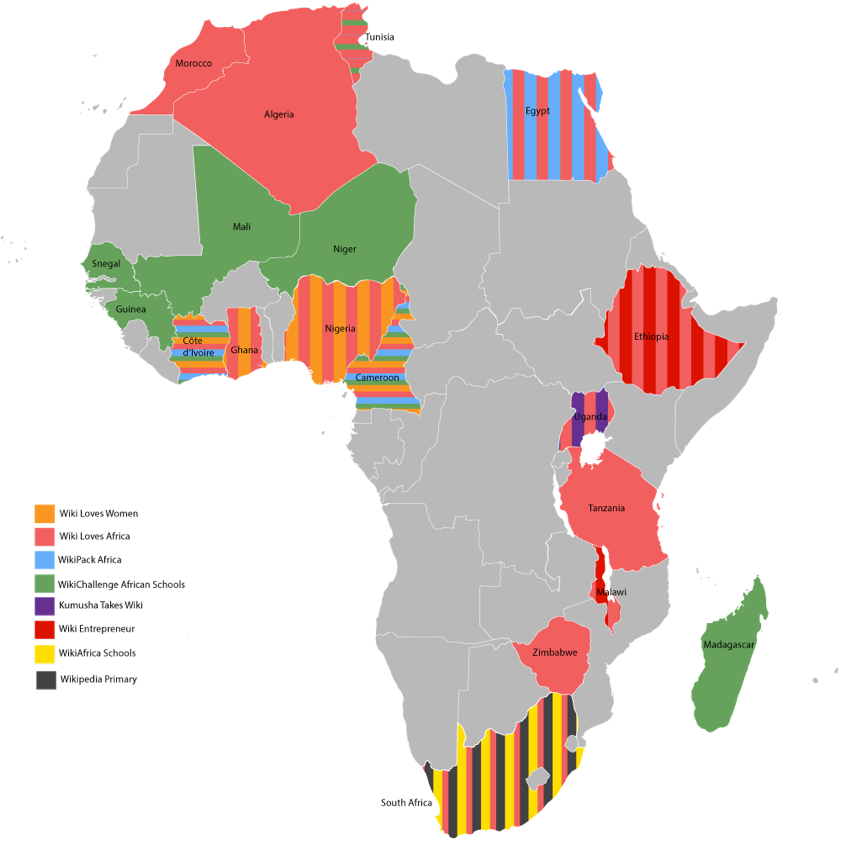As Abel Asrat, a Wikipedian in Residence from Ethiopia, explains it, “[Open Movement] can be a platform that allows people to access contents and materials openly or it can be a social gathering and movement toward knowledge and experience sharing.” Across Africa, several organizations are keen in allowing people access knowledge freely and openly. At the Open Advocate Training Course...
As Abel Asrat, a Wikipedian in Residence from Ethiopia, explains it,
“[Open Movement] can be a platform that allows people to access contents and materials openly or it can be a social gathering and movement toward knowledge and experience sharing.”
Across Africa, several organizations are keen in allowing people access knowledge freely and openly. At the Open Advocate Training Course currently ongoing at the Africa Centre, the students – Erina, Abel, Cyriac and Michael – presented a kinda Open Movement landscape or outline in their country.
In Ethiopia, eLearning Ethiopian social network was established with the aim of introducing eLearning technology and methods to Ethiopian Universities and TVET ( Technical Vocational Education and Training) colleges in 2009. Meanwhile the Temari Net (which means Student Net) was built targeting university students. Social gathering events like TedxAddis and barcamp Ethiopia are also attracting a larger crowd who is very keen to network, connect and share ideas. Abel tells us more.
Malawi Library Information Consortium (MALICO), SchoolNet Malawi, and The White Spaces project are some of the Information Communication Technology initiatives and projects in Malawi. With regards to Open Access initiatives The Malawi National Digital Repository, National Archives of Malawi, and National Library Service – Mobile Library Services are helping shed much light on historic information in Malawi plus also increasing literacy rates in the country. Phoya explains more of these initiatives on Wiki Malawi.
The Uganda Bureau of Statistics is also a player in the open movement through provision of data that is free from bias. It also has a Resource center that is open to the public. Mapping day is an open data initiative in Uganda with partners such as Mountbatten which is an ICT company and the Fruits of Thought which is a collection of projects. Mapping Day organizes mapping events and much more that contribute to open movements such as OpenStreetMap. Learn more about Open Movements in Uganda.
The establishment of Ghana Open Data Initiative is meant to promote efficiency, transparency and accountability in governance as well as to facilitate economic growth by means of the creation of Mobile and Web applications for the Ghanaian and world markets. To build a network of Ghanaian doers, entrepreneurs and changemakers, Barcamp Ghana, a project of the Ghana Think Foundation is making fast progress with this goal and have already organized more than 25 of such Barcamp event already. The Ghana-India Kofi Annan Centre of Excellence in ICT and Tech Needs Girls initiative by Soronko Solutions are all part of some of the Open Initiatives and or Movements in Ghana.
An Africa map indicates some of the activities of other Open Movements across Africa.
WikiAfrica is an international movement that takes place on the African continent and beyond. It encourages individuals, interested groups and organisations to create, expand and enhance online content about Africa. This involves motivating for the representation of the continent’s contemporary realities and history, its peoples and its innovations on the world’s most used encyclopaedia, Wikipedia. WikiAfrica is not owned by one organisation and it belongs to all people and organisations contributing to its scope.
In its various guises and hosted at several institutions (including Lettera27, Africa Centre, Ynternet.org, and Wikimedia CH), the WikiAfrica movement has consistently instigated and led multi-faceted innovative projects. These projects have activated communities and driven content onto Wikipedia. Examples include Share Your Knowledge, #OpenAfrica training Courses and Toolkits, Kumusha Bus (in Ethiopia and Ghana), WikiEntrepreneur (in Ethiopia and Malawi), Kumusha Takes Wiki (Cote d’Ivoire and Uganda) and Wiki Loves Africa.
Over 2016/17 it is working on Wiki Loves Women (in collaboration with the Goethe-Institut), WikiPack Africa, WikiFundi and the WikiChallenge African Schools (funded by the Orange Foundation), WikiAfrica Schools (funded by lettera27), Wikipedia Primary (funded by SUPSI) and Wiki Loves Africa (funded by Wikimedia Foundation).
WikiAfrica was started in 2006 as a collaboration between Wikimedia IT and lettera27, since then – via the support of several organisations and the work of a few people – it has grown to embrace the continent and build communities. It has been pivotal in driving the current contributions done by communities across sub-Saharan Africa.
The projects detailed below form the main backbone of the WikiAfrica movement. They have all been conceptualised, instigated and led by three members of Wiki In Africa, although until 2017 through the agency or fiscal sponsorship of different organisations.
2006
2009
2011
2012
2013
2014
2015
2016
2017

The organisations that have hosted or are collaborating on Wiki Africa projects include: